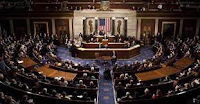The Senate passed the Taxpayer First Act (H.R. 3151) on Thursday, June 13 by a voice vote. The bill includes provisions to improve customer service, protect personal data, preserve tax-preparation services and curb private debt collectors. The measure now goes to the President who is expected to sign.
On June 6, House Ways and Means Committee member John Lewis (D-GA) introduced a revised Taxpayer First Act (HR 3151), which removes a section that would have required IRS to continue the Free File program in collaboration with private companies such as H&R Block and Turbo Tax, commonly referred to as the Free File Alliance.
An earlier version of the bill would have codified language potentially preventing IRS from creating its own Free File program for low-income households.
Aside from the Free File language, the bill preserves the IRS Oversight Board, establishes an independent Office of Appeals, and permanently authorizes the volunteer income tax assistance program for low-income filers.
The bill also limits the ability of private debt collectors to pursue unpaid taxes from low-income taxpayers and codifies an exclusion from upfront fees and initial payments in the offer in compromise program for taxpayers with incomes below 250% of the federal poverty level.
The bill would:
- Change the management and oversight of the Internal Revenue Service (IRS) with the aim of improving customer service and the process for assisting taxpayers with appeals; restrict certain IRS enforcement activities, including the use of private debt collectors in certain cases; and modify the agency’s organization.
- Aim to combat identity theft and tax refund fraud, create an automated system to verify taxpayer information for authorized users, modernize information technology systems within the IRS, and expand the use of electronic information systems within the IRS.
- Change several provisions in the laws that govern the IRS.
- Increase the penalty for tax returns filed more than 60 days after the due date.
Estimated budgetary effects would primarily stem from
- A restriction on the use of private debt collectors for certain taxpayers.
- An increase in the penalty for tax returns filed 60 days after the due date.
- A modification to electronic filing requirements for certain preparers.
- CBO has not completed an estimate of the bill’s costs that are subject to annual appropriation.
Read more at: Tax Times blog




